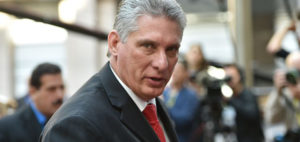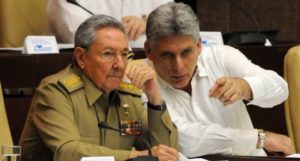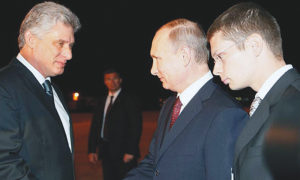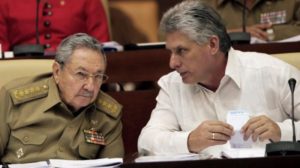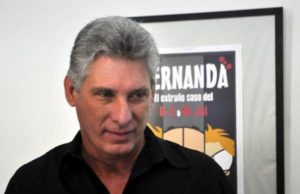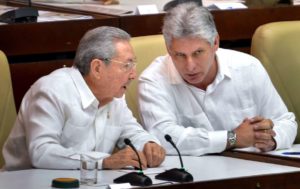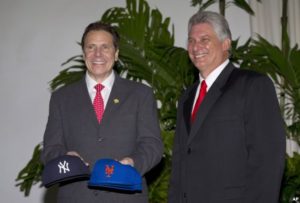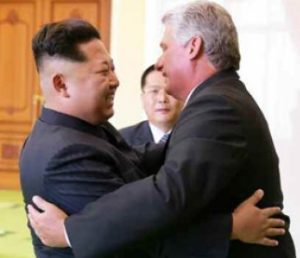(TIRANDO A FONDO) CUBA AND THE POLITICAL CAREER OF MIGUEL DÍAZ-CANEL.
The current position of Diaz-Canel is no guarantee that he will become the fifth president of Cuba since 1959. He still has time to screw up, offend or disappoint Raul or, worse, give some indication that it would not be, If they make it president, as docile and gray as until now. If he escapes a note of sincerity or intelligence, if he whispers to his wife or his best friend a joke about Raul, and State Security hears him, if he tells someone what he would do as president if he were really president And not just lieutenants, Diaz-Canel will go to where Carlos Aldana, Roberto Robaina and Carlos Lage are, at the bottom of the Revolution’s history, a horrid place inhabited by the unburied corpses of former communist princes, fallen suddenly in disgrace And executed with a great blow of saber by the fury of Fidel or Raúl. Diaz-Canel is almost the only survivor of some relevance among politicians of his generation, which indicates that, although he lacks other talents, he has no doubt to please his bosses or at least, not to cause them discomfort or worry .
The career of Díaz-Canel has been portentous for his mediocrity, but the modesty of the positions he has occupied so far has protected him very effectively, he has served to avoid the destructive scrutiny that were submitted by Fidel and Raúl those placed by them Same in positions of more notoriety or power. Always invisible, Diaz-Canel did not become first secretary of the Union of Young Communists, a position from which Lage and Robaina were catapulted into Fidel’s inner circle. He was first secretary of the Communist Party in Villa Clara, and lasted so long in the post that it seemed that Fidel had completely forgotten about him and his province. Diaz-Canel observed from the bucolic monotony of the Villas how Lage became a sort of prime minister and general administrator of the misery of Cuba, and Robaina, in chancellor. Even when Robaina fell, Diaz-Canel saw another upstart, Felipe Perez Roque, be elevated to Minister of Foreign Affairs.
In Santa Clara, Diaz-Canel acquired a certain reputation as liberal and enlightened, at least in comparison with the energetics who had preceded him and those who suffered even more unfortunate provinces. It was not that Villa Clara became Massachusetts under his command, but Diaz-Canel very notably tolerated the transvestite shows at the celebrated club El Mejunje, and the laborious investigative journalism of the High Tension program of CMHW, two oddities in Cuba That if they had appeared in another place, Camagüey, Granma, Santiago, would have been annihilated at once by the State Security, and all those rioters, the false Farah Marias and the investigative journalists, shaken until they were removed from the pajarería or The ridiculous idea of doing journalism. Either Fidel never heard of these political peccadilloes of Diaz-Canel, or else he decided that a little of Farah María and a little, a little bit, of Abel Falcón and Xiomara Rodríguez, were a fair price to pay to keep Villa Clear, peaceful and obedient.
The prize given to Diaz-Canel to get only half of Villa Clara to leave the country during the 1990s, and the other half to continue marching and shouting, was not a juicy ministry with a hefty dollar budget, But Holguin, and a seat in the Political Bureau. There is no evidence that Holguin had prospered during the consulship of Diaz-Canel, but the province was already in such a state upon his arrival that little could have been done by him or anyone to make things worse. Prudente, Diaz-Canel was not associated in the Political Bureau with Lage and Perez Roque, who should have been, by age if for no other reason, his loyal allies. Perhaps Diaz-Canel sensed that Lage and Perez Roque had their days counted, or else they suspected that the years that had passed far from the capital had made Diaz-Canel a new, rogue Jose Ramon Machado Ventura, who had to take care of himself as much as Machado Ventura, but when the Vice-President and Chancellor of Cuba were sensationally defenestrated in March 2009, the first Communist Party secretary in Holguin saw them fall with the same parsimony with which he had seen his rise.
The fall of Lage and Perez Roque was the best thing that ever happened to Diaz-Canel’s career. Only two months later, Raúl took him to Havana and gave him a ministry, even if he was a despicable one as a Higher Education. When Raul began to look for someone who had not already completed 80 to leave him head of state in 2018, he did not see many candidates who were moderately credible as president, who could go to the United Nations, or the Ibero-American summits, or to Moscow or Beijing Without embarrassing Cuba and making it look uncivilized. Díaz-Canel, who had not been minister of anything important, who had not ruled either of the two largest cities in the country, who had not been involved in the planning or execution of Cuba’s international policy or defense strategy And security, but he was less than 70, and all his teeth and hair, and he had been able to obey without jesting for thirty years, was the chosen one. Between teeth, Diaz-Canel must have complained of his eternal bad luck. He just wanted a ministry.
Raúl could still, even without Diaz-Canel do anything, change his mind and choose another president. The new National Assembly that will be soviet designated at the beginning of next year will be as complacent as the previous one, and will vote for whoever is told to vote, and will do it with great pleasure, nobody will say a tweet. Raul, who will retain all the royal power from his position as first secretary of the Communist Party, could give the post to any of his followers, what matters to which, provided he is not too old, is not going to be that the new President to die halfway through his term and have to find another one to race. There has, however, been no apparent effort to give any alternative candidate to Diaz-Canel, while the latter have had him for five years touring the country and delivering speeches at the congresses to which Raúl It does not take the work of attending, like that of journalists. He was even sent to Rome to greet the Pope.
Some observers abroad insist that Raul will try to raise his own son, Colonel Alejandro Castro Espin, but that seems unlikely, Raul is not Kim Jong-il, it will save face. Castro Espín is practically unknown in Cuba, most of the Cubans have never seen him or heard him speak, he has not had any important public post so far, he is nothing more than the son of his father, although he already has enormous power. It will be interesting to see where Castro Espín remains after the elections, if he remains hidden in the heart of Cuba’s security, defense and espionage apparatus, or if it is brought to light, that is, the headlines of the National Television News, In a place where it can be seen and examined by the country and whoever remains in the world still interested in the matter, in the Council of State, or minister of some thing. From a position of greater prominence, Castro Espin would represent his father and the ghostly phantom of his uncle, and would be on edge to conquer power when the occasion arises, which may be as soon as the first time Diaz-Canel says Ji and Raul say heh.
The most depressing of these speculations is that it does not matter too much who will become president of Cuba next year. The title will have no value as long as Raúl lives and controls the Political Bureau of the Party, the Armed Forces and State Security, and a closed circle of generals and colonels manages the country’s economy, which is still producing money instead To squander it. The power of the next president of the Council of State will be so little, that could well give the post to a notable, Miguel Barniz, Silvio Rodriguez, the duo Buena Fe, both, that people would not notice the difference between them and Díaz-Canel or any other politician. A Solomon would be much to ask for, but Cuba would need, after Fidel and Raúl, someone who has the courage to shake the country until it is cleared of its boba. A man, although it would be better for a woman, who has traveled the world, and not only as part of official delegations, who has read extensively, and not only speeches of Fidel and Che’s diary, but, if you can ask, to Shakespeare, Cervantes, Dostoevsky, The Enlightenment, who has studied economics, law, finance, history, political science, philosophy, communication, in a real university, not in an alleged Party school. Still more necessary would be for Cubans to have compassion and affection, and, crucially, to understand the meaning, joy, and benefits of freedom. Cuba, after all, does not need a general or an economist, much less one of those inexplicable creatures called, in the language of barbarians, cadres of the Party, a Diaz-Canel. He needs a Democrat.
Of those, there is not a single one in Raúl’s court.
(TIRANDO A FONDO) CUBA Y LA POLÉMICA CARRERA POLÍTICA DE MIGUEL DÍAZ-CANEL.
La actual posición de Díaz-Canel no es garantía de que vaya a convertirse en el quinto presidente de Cuba desde 1959. Todavía le queda tiempo de meter la pata, ofender o decepcionar a Raúl o, peor, dar alguna indicación de que no sería, si lo hacen presidente, tan dócil y gris como hasta ahora. Si se le escapa una nota de sinceridad o inteligencia, si susurra al oído de su esposa o su mejor amigo un chiste sobre Raúl, y la Seguridad del Estado lo oye, si le dice a alguien lo que haría como presidente si fuera presidente de verdad y no solo de mentiritas, Díaz-Canel irá a parar a donde están Carlos Aldana, Roberto Robaina y Carlos Lage, al fondo de la historia de la revolución, un paraje horrísono habitado por los cadáveres insepultos de antiguos príncipes comunistas, caídos súbitamente en desgracia y ejecutados con un gran golpe de sable por la furia de Fidel o la de Raúl. Díaz-Canel es casi el único sobreviviente de alguna relevancia entre los políticos de su generación, lo que indica que, si bien le faltan otros talentos, tiene sin dudas el de complacer a sus jefes o al menos, el de no causarles molestia o preocupación.
La carrera de Díaz-Canel ha sido portentosa por su mediocridad, pero la modestia de los cargos que ha ocupado hasta ahora lo ha protegido muy efectivamente, le ha servido para evitar el destructivo escrutinio al que fueron sometidos por Fidel y Raúl aquellos colocados por ellos mismos en posiciones de más notoriedad o poder. Siempre invisible, Díaz-Canel no llegó a ser primer secretario de la Unión de Jóvenes Comunistas, una posición desde la que fueron catapultados Lage y Robaina al círculo íntimo de Fidel. Fue primer secretario del Partido Comunista en Villa Clara, y duró tanto en el puesto que parecía que Fidel se había olvidado completamente de él y de su provincia. Díaz-Canel observó desde la bucólica monotonía de las Villas cómo Lage se convertía en una suerte de primer ministro y administrador general de la miseria de Cuba, y Robaina, en canciller. Incluso, cuando Robaina cayó, Díaz-Canel vio a otro advenedizo, Felipe Pérez Roque, ser elevado a Ministro de Relaciones Exteriores.
En Santa Clara, Díaz-Canel adquirió cierta reputación de liberal e ilustrado, al menos en comparación con los energúmenos que le habían precedido y los que padecían provincias aún más desafortunadas. No es que Villa Clara se convirtiera en Massachusetts bajo su mando, pero Díaz-Canel, muy notablemente, toleró los espectáculos de travestismo en el célebre club El Mejunje, y el laborioso periodismo investigativo del programa Alta Tensión de la CMHW, dos rarezas en Cuba que, de haber aparecido en otro lugar, Camagüey, Granma, Santiago, habrían sido aniquiladas en el acto por la Seguridad del Estado, y todos esos revoltosos, las falsas Farah Marías y los periodistas investigativos, sacudidos hasta que se les quitara la pajarería o la ridícula idea de hacer periodismo. O bien Fidel no se enteró nunca de esos pecadillos políticos de Díaz-Canel, o bien decidió que un poco de Farah María y un poco, solo un poquito, de Abel Falcón y Xiomara Rodríguez, eran un precio justo a pagar para mantener a Villa Clara pacífica y obediente.
El premio que le dieron a Díaz-Canel por lograr que sólo la mitad de Villa Clara se fuera del país durante los años noventa, y la otra mitad siguiera marchando y dando alaridos revolucionarios, no fue un jugoso ministerio con un abultado presupuesto en dólares, sino Holguín, y un asiento en el Buró Político. No hay ninguna evidencia de que Holguín haya prosperado durante el consulado de Díaz-Canel, pero la provincia estaba ya en tal estado a su llegada que poco podría haber hecho él o cualquiera para hacer las cosas peores. Prudente, Díaz-Canel no se asoció en el Buró Político con Lage y Pérez Roque, que deberían haber sido, por edad si no por otra razón, sus leales aliados. Quizás Díaz-Canel intuyó que Lage y Pérez Roque tenían los días contados o bien aquellos sospecharon que los años pasados lejos de la capital habían convertido a Díaz-Canel en un nuevo, rozagante José Ramón Machado Ventura, del que debían cuidarse tanto como del Machado Ventura original, pero cuando el vicepresidente y el canciller de Cuba fueron sensacionalmente defenestrados en marzo del 2009, el primer secretario del Partido Comunista en Holguín los vio caer con la misma parsimonia con que había visto su ascenso.
La caída de Lage y Pérez Roque fue lo mejor que le pasó jamás a la carrera de Díaz-Canel. Sólo dos meses después, Raúl lo llevó para La Habana y le dio un ministerio, aunque fuera uno deleznable como Educación Superior. Cuando Raúl comenzó a buscar a alguien que no hubiera cumplido ya 80 para dejarle la jefatura del Estado en 2018, no vio muchos candidatos que fueran medianamente creíbles como presidente, que pudieran ir a las Naciones Unidas, o a las cumbres iberoamericanas, o a Moscú o Beijing sin avergonzar a Cuba y hacerla lucir incivilizada. Díaz-Canel, que no había sido ministro de nada importante, que no había gobernado ninguna de las dos ciudades más grandes del país, que no había estado involucrado en el planeamiento o la ejecución de la política internacional de Cuba o de su estrategia de defensa y seguridad, pero tenía menos de 70, y todos sus dientes y su pelo, y había sabido obedecer sin chistar durante treinta años, fue el elegido. Entre dientes, Díaz-Canel debe haberse quejado de su sempiterna mala suerte. Él sólo quería un ministerio.
Aún podría Raúl, incluso sin que Díaz-Canel haga nada, cambiar de parecer y escoger otro presidente. La nueva Asamblea Nacional que será soviéticamente designada a inicios del próximo año, será tan complaciente como la anterior, y votará por quien le digan que vote, y lo hará con gran gusto, nadie dirá ni pío. Raúl, que conservará todo el poder real desde su puesto de primer secretario del Partido Comunista, podría darle el puesto a cualquier otro de sus secuaces, qué importa a cuál, con tal de que no sea demasiado viejo, no vaya a ser que el nuevo presidente se muera a mitad de su término y haya que buscar otro a la carrera. No ha habido, sin embargo, ningún esfuerzo aparente para darle relevancia y lucimiento a ningún candidato alternativo a Díaz-Canel, mientras que a este lo han tenido durante cinco años dando vueltas por el país y pronunciando discursos en los congresos a los que ya Raúl no se toma el trabajo de asistir, como el de los periodistas. Hasta lo enviaron a Roma a saludar al Papa.
Algunos observadores en el extranjero insisten en que Raúl intentará elevar a su propio hijo, el coronel Alejandro Castro Espín, pero eso parece improbable, Raúl no es Kim Jong-il, va a guardar las apariencias. Castro Espín es prácticamente desconocido en Cuba, la mayoría de los cubanos nunca lo han visto ni lo han oído hablar, no ha tenido hasta ahora ningún puesto público importante, no es más que el hijo de su padre, aunque tenga ya un enorme poder. Será interesante observar dónde queda Castro Espín después de las elecciones, si sigue oculto en el corazón del aparato de seguridad, defensa y espionaje de Cuba, o si es sacado a la luz, es decir, a los titulares del Noticiero Nacional de Televisión, puesto en un sitio donde pueda ser visto y examinado por el país y quien quiera que quede en el mundo todavía interesado en el asunto, en el Consejo de Estado, o ministro de alguna cosa. Desde un puesto de más prominencia, Castro Espín representaría a su padre y al vocinglero fantasma de su tío, y estaría en punta para conquistar el poder cuando se le presente la ocasión, que puede ser tan pronto como la primera vez que Díaz-Canel diga ji y Raúl diga je.
Lo más deprimente de estas especulaciones es que no importa demasiado quién se convertirá en presidente de Cuba el año que viene. El título no tendrá valor mientras Raúl viva y controle el Buró Político del Partido, las Fuerzas Armadas y la Seguridad del Estado, y un cerrado círculo de generales y coroneles administre la economía del país, lo que queda en ella que todavía produce dinero en vez de derrocharlo. El poder del próximo presidente del Consejo de Estado será tan poco, que bien podrían darle el puesto a un notable, a Miguel Barniz, a Silvio Rodríguez, al dúo Buena Fe, a los dos, que la gente no notaría la diferencia entre ellos y Díaz-Canel o cualquier otro político. Un Salomón sería mucho pedir, pero Cuba necesitaría, después de Fidel y Raúl, alguien que tenga el coraje de sacudir al país hasta que se le quite la bobería que tiene. Un hombre, aunque sería mejor una mujer, que hubiera viajado por el mundo, y no sólo como parte de delegaciones oficiales, que haya leído extensamente, y no sólo discursos de Fidel y el diario del Che, sino, si se puede pedir, a Shakespeare, a Cervantes, a Dostoievsky, El Siglo de las Luces, que haya estudiado economía, derecho, finanzas, historia, ciencia política, filosofía, comunicación, en una universidad de verdad, no en una supuesta escuela del Partido. Más necesario aún sería que tuviera por los cubanos compasión y afecto, y, crucialmente, que comprendiera el significado, el júbilo y los beneficios de la libertad. Cuba, a fin de cuentas, no necesita un general ni un economista ni mucho menos una de esas inexplicables criaturas llamadas, en lengua de bárbaros, cuadros del Partido, un Díaz-Canel. Necesita un demócrata.
De esos, no hay ni uno solo en la corte de Raúl.
Agencies/Estornudo/Juan O. Pérez/Extractos/Internet Photos/ Arnoldo Varona/ TheCubanHistory.com
THE CUBAN HISTORY, HOLLYWOOD.



